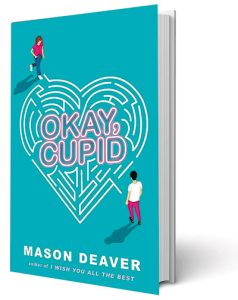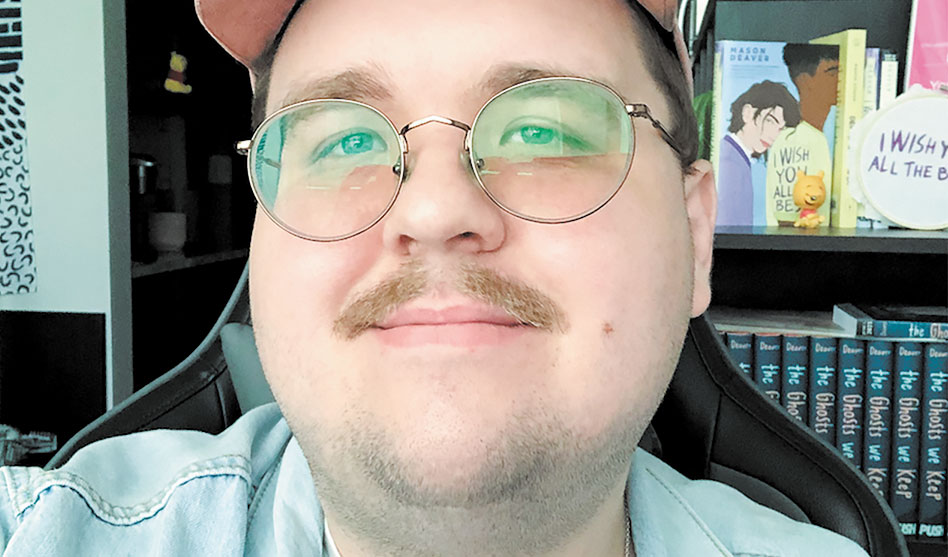Mason Deaver discusses their newest book and the need for trans stories
MELISSA WHITLER |Contributing Writer
Bestselling author Mason Deaver is back with a heartwarming romance that reveals the complexities of human love. Okay, Cupid follows the story of Jude, a young Cupid looking to redeem themselves after failing their previous assignment. What is a Cupid, you may ask. They’re somewhat magical beings whose purpose is to help human beings fall in love. They play a background role in people’s lives, making sure not to get too attached or invested in their assignments.
Except Jude isn’t satisfied with that.
Mason Deaver discussed with Dallas Voice the inception of Okay, Cupid and their experience writing transgender and non-binary love stories.
Dallas Voice: Where did you first get the idea for Okay, Cupid?
Mason Deaver: It was during the query process for my first novel, I Wish You All the Best, that I found myself eager to work on something. It’s a common piece of advice that authors will give other writers, to make yourself busy while you wait for news. I had this thought, an idea of someone perpetually stuck as the best friend in a rom-com, someone we never see get their own happy ending. And from there, it spiraled. What if that was their purpose? What if they were meant to never get their own happy ending? It was easier to connect the dots to Cupids and build the world from there.
How does it feel to finally have this story released to the world after so long?
It’s a huge relief honestly. It took me so long to find the right voice for this story, to adapt Cupid in a way that I found satisfactory. It was a lengthy process to finding happiness with this book, and I’m so grateful that I did.
 How did you come up with the kind of magical system in the book? Do you have an extended backstory on the cupids and how they came to exist differently than humans? Yes and no?
How did you come up with the kind of magical system in the book? Do you have an extended backstory on the cupids and how they came to exist differently than humans? Yes and no?
I went in wanting to write a contemporary fantasy, but with my own concession that it was going to be 95 percent contemporary, and 5 percent fantasy. I just don’t have the brain for so much worldbuilding and magic, I’m here for the characters.
There are details and elements about the Cupid world that I wrote in previous drafts that I like to think would’ve made it had I found the room in the newer versions of the story; there are things that nearly made it that I cut at the last minute, and there are details that I never wrote down, that I figured out for myself later. What remains in the book, I left because it has a purpose. Everything else feels superfluous or redundant. Like I said, I’m here for the characters, for their love story. That’s its own kind of magic.
What do you want young LGBTQ readers to take away from the book about first love?
That they’re messy and imperfect. That it can hurt; it can even feel like the end of the world. That it doesn’t always end well, but to have had it in the first place, to experience the thudding in your chest and the rolling in your stomach and the sweat on your palms is all so beautiful, and perfect, that it’s wonderful to be so alive that you’re able to feel these feelings.
What has it been like getting to work with David Levithan, prolific and award-winning LGBTQ+ author, as an editor?
David’s amazing! He has such an eye for voice and character in a way that I know for certain has made my own voice stronger. But when the time comes, he’s also ready to trust my judgement, to respect my own instinct when it comes to storytelling. It’s been such a great partnership over the years.
All your books center around non-binary/transgender characters. How does it feel to be writing that representation for kids growing up now?
It’s exciting, but it’s also terrifying. First and foremost, I’m writing for myself. I’m writing the stories that I wish I’d had as a teenager. The fact that there are readers around now who are still desperate for the same stories I was desperate for at that age just means that my books are able to find their audience. It’s so heartwarming to hear from readers, to see their faces at signings and events, to hear their own stories of how they felt seen by my characters. There’s no other feeling like it.
Unfortunately, it tends to be a double-edged sword, because no person is a monolith, and no one artist can create for everyone. So of course, there are those who go to my books only to be disappointed by what they find, and that’s no fault of theirs just as it’s no fault of mine. Not every story is for every person, even when you want it to be. So, there is this fear of being made into a voice that supposedly represents an entire community, when that’s incredibly irresponsible to even want, let alone to have the label applied to you.
It’s about finding where you fit in. Much like in real life, it’s about finding community, finding those who want to hear your voice in the hope that they’ll feel seen, or that they might be given the chance to learn something.
Do you get a lot of inspiration from your own life experience?
I think it’s impossible to say that anyone’s personal life hasn’t impacted their art. It’s a common point of discussion as the conversation around A.I. generated “art” comes to the forefront of technology. There’s a lifelessness to this form, thrown together via stolen elements found from artists who’ve poured hours into their work to post online. And it isn’t to say that A.I. doesn’t have a place in our lives to help with questions and research, but to call what it creates “art” feels grossly irresponsible.
I don’t even like to use the word “create” in relation to A.I. To be a human is to feel, to be hurt, to be in love, to form connections and develop anxieties. It’s these things that inform us both in our everyday lives as well as the things that we create. Everything I write draws from my personal experience, even when I don’t mean for it to.
There are characters or story elements or emotions that I recall years after they’re published that I realize hit closer to home. It’s an impossible thing to avoid; I think as authors we’re completely helpless to it. And I don’t think there’s anything wrong with that, I think it’s amazing to see how experiences and life shape how we write certain characters and dialogue. It makes things so unique and personal.
For more information about Okay, Cupid and Mason Deaver, visit MasonDeaversWrites.com.










